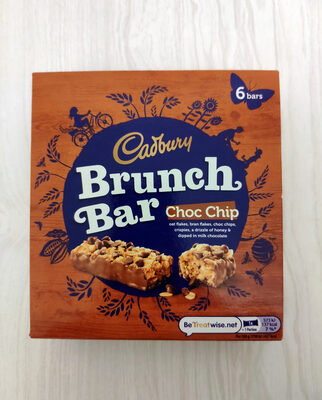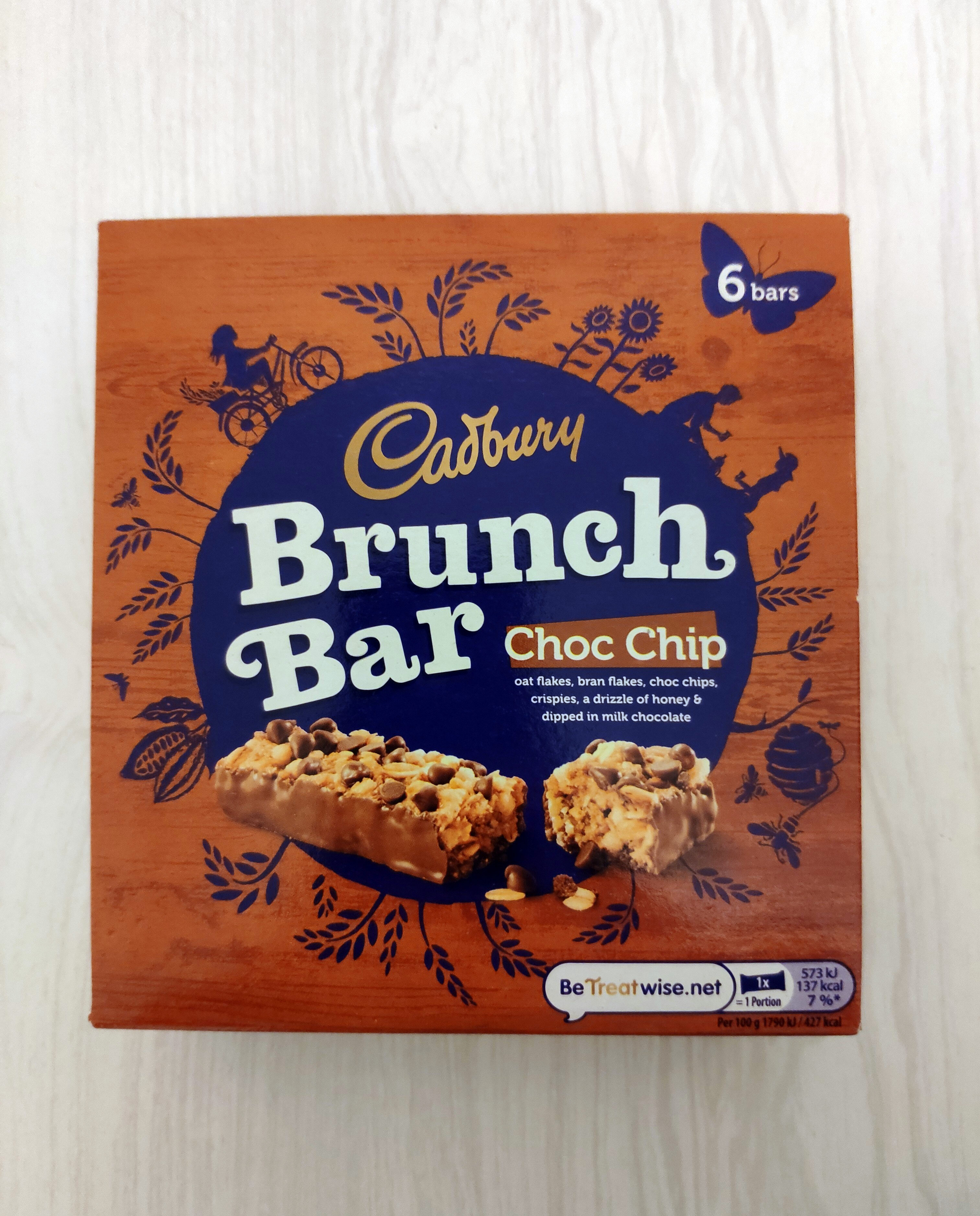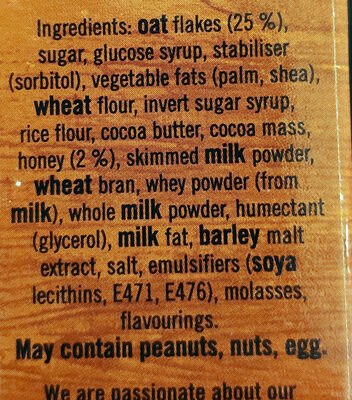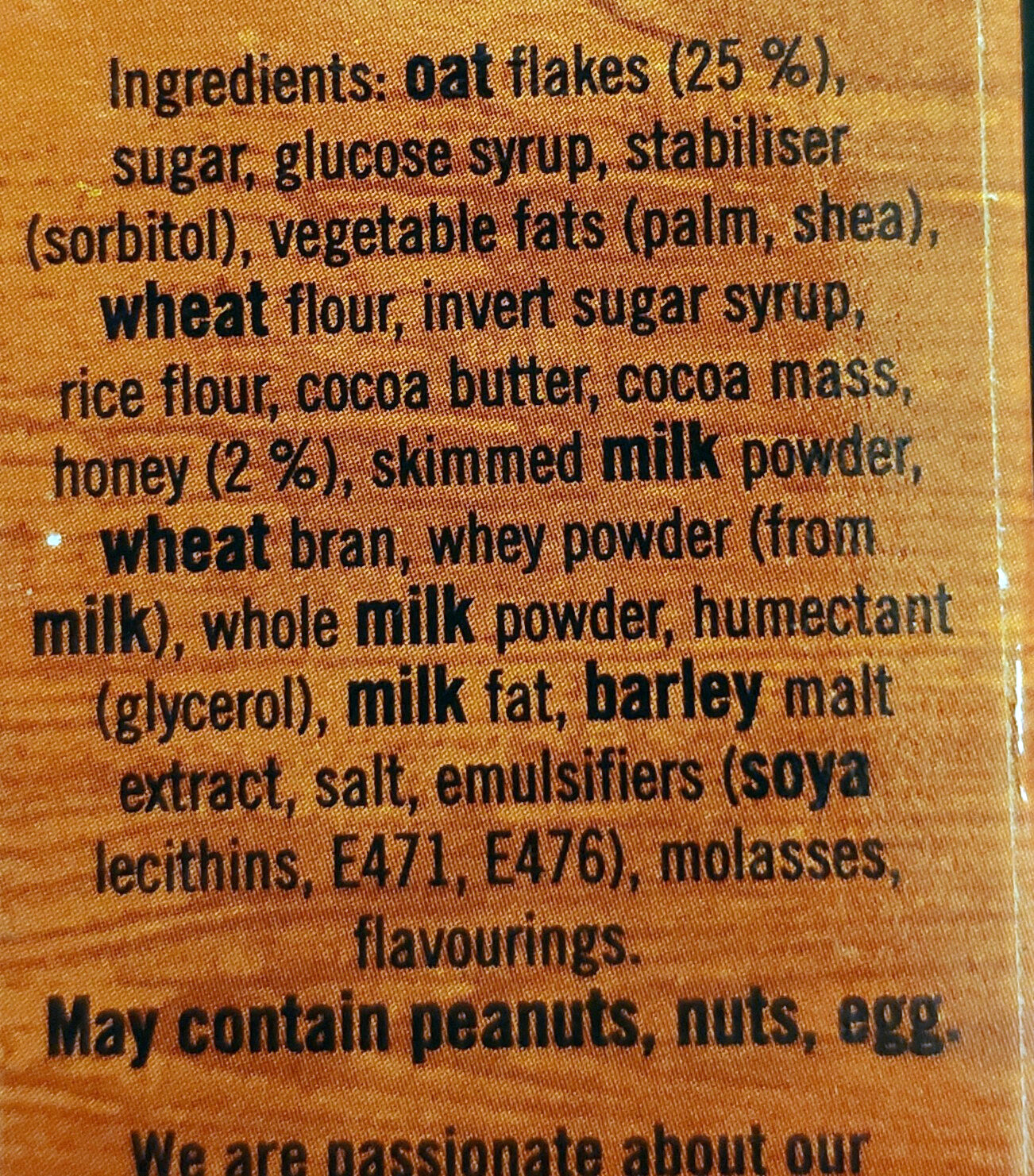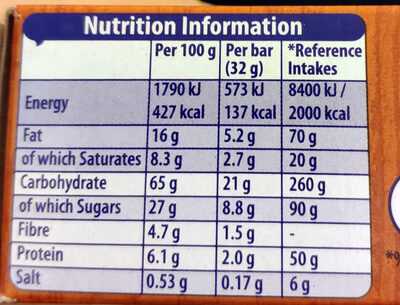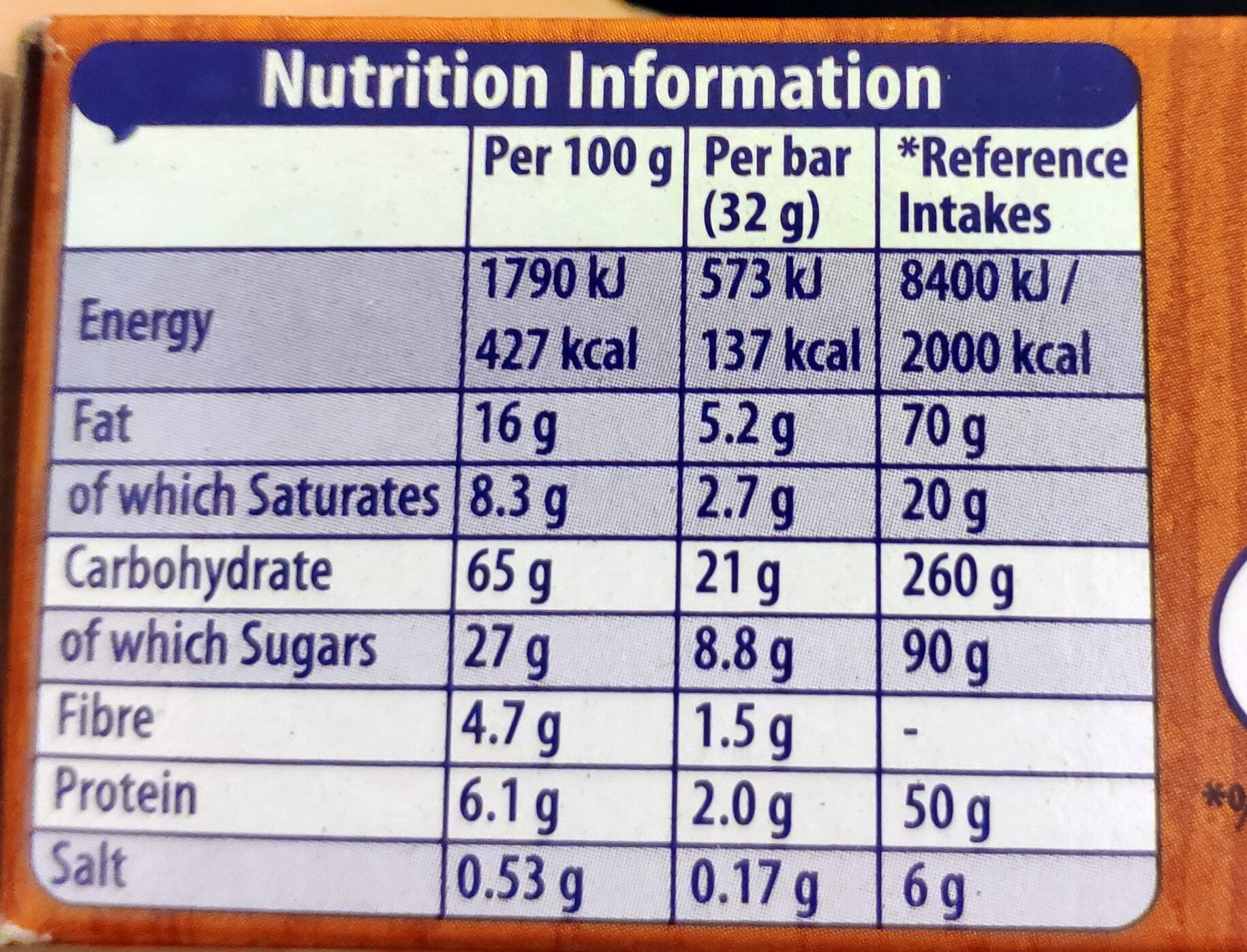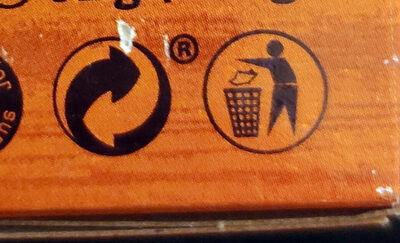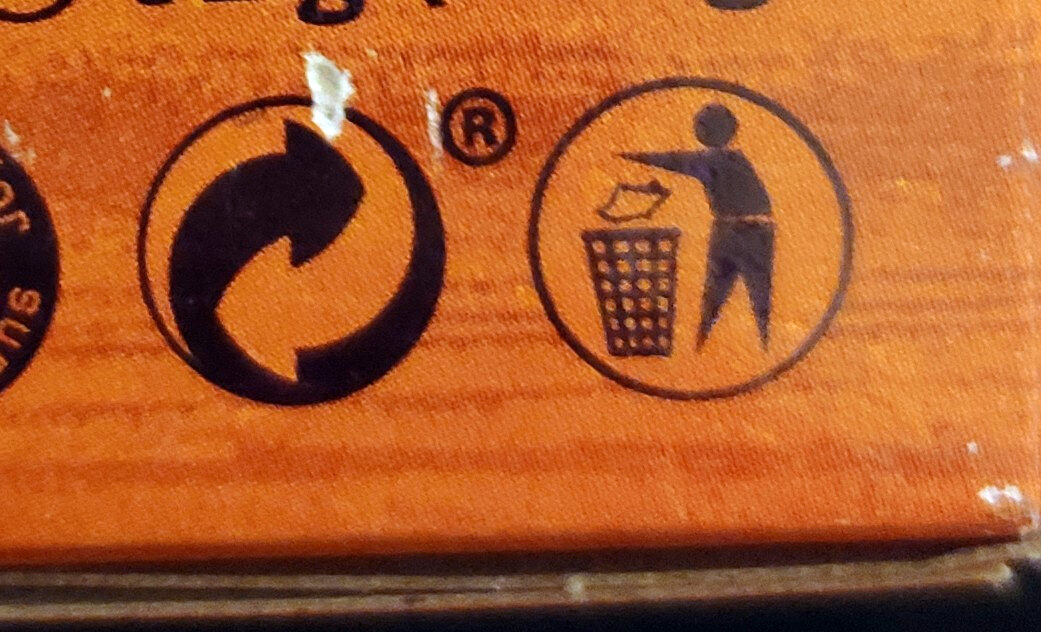Help us make food transparency the norm!
As a non-profit organization, we depend on your donations to continue informing consumers around the world about what they eat.
The food revolution starts with you!
Lindt Mini Eggs - Cadbury - 192 g
Lindt Mini Eggs - Cadbury - 192 g
This product page is not complete. You can help to complete it by editing it and adding more data from the photos we have, or by taking more photos using the app for Android or iPhone/iPad. Thank you!
×
Barcode: 7622210149718 (EAN / EAN-13)
Ainm coitianta: Cereal and milk chocolate chip bar half covered with milk chocolate
Quantity: 192 g
Packaging: en:Card-box, en:Mixed plastic film-packet
Catagóirí: en:Snacks, en:Sweet snacks, en:Bars, en:Cereal bars, en:Chocolate cereal bars
Labels, certifications, awards:
en:Vegetarian, en:Green Dot
Siopaí: Sainsbury's
Country: An Fhrainc, An Ríocht Aontaithe
Matching with your preferences
Health
Comhábhair
-
30 ingredients
: oat flakes (25 %), sugar, glucose syrup, stabiliser (sorbitol), vegetable fats (palm, shea), wheat flour, invert sugar syrup, rice flour, cocoa butter, cocoa mass, honey (2 %), skimmed milk powder, wheat bran, whey powder (from milk ), whole milk powder, humectant (glycerol), milk fat, barley malt extract, salt, emulsifiers ( soya lecithins, e471, e476), molasses, flavouringsHailléirginí: Glútan, Pónairí soigheTraces: Uibheacha, Cnónna, Piseanna, en:en-eggs-en-nuts
Food processing
-
Ultra processed foods
Elements that indicate the product is in the en:4 - Ultra processed food and drink products group:
- Additive: E322
- Additive: E420
- Additive: E422 - Gliocról
- Additive: E471
- Additive: E476 - Polairicineoláit pholaigliocróil
- Comhábhar: Eiblitheoir
- Comhábhar: Flavouring
- Comhábhar: Glúcós
- Comhábhar: Glucose syrup
- Comhábhar: Taisleán
- Comhábhar: Invert sugar
- Comhábhar: Whey
Food products are classified into 4 groups according to their degree of processing:
- Unprocessed or minimally processed foods
- Processed culinary ingredients
- Processed foods
- Ultra processed foods
The determination of the group is based on the category of the product and on the ingredients it contains.
Additives
-
E322
Lecithin: Lecithin -UK: , US: , from the Greek lekithos, "egg yolk"- is a generic term to designate any group of yellow-brownish fatty substances occurring in animal and plant tissues, which are amphiphilic – they attract both water and fatty substances -and so are both hydrophilic and lipophilic-, and are used for smoothing food textures, dissolving powders -emulsifying-, homogenizing liquid mixtures, and repelling sticking materials.Lecithins are mixtures of glycerophospholipids including phosphatidylcholine, phosphatidylethanolamine, phosphatidylinositol, phosphatidylserine, and phosphatidic acid.Lecithin was first isolated in 1845 by the French chemist and pharmacist Theodore Gobley. In 1850, he named the phosphatidylcholine lécithine. Gobley originally isolated lecithin from egg yolk—λέκιθος lekithos is "egg yolk" in Ancient Greek—and established the complete chemical formula of phosphatidylcholine in 1874; in between, he had demonstrated the presence of lecithin in a variety of biological matters, including venous blood, in human lungs, bile, human brain tissue, fish eggs, fish roe, and chicken and sheep brain. Lecithin can easily be extracted chemically using solvents such as hexane, ethanol, acetone, petroleum ether, benzene, etc., or extraction can be done mechanically. It is usually available from sources such as soybeans, eggs, milk, marine sources, rapeseed, cottonseed, and sunflower. It has low solubility in water, but is an excellent emulsifier. In aqueous solution, its phospholipids can form either liposomes, bilayer sheets, micelles, or lamellar structures, depending on hydration and temperature. This results in a type of surfactant that usually is classified as amphipathic. Lecithin is sold as a food additive and dietary supplement. In cooking, it is sometimes used as an emulsifier and to prevent sticking, for example in nonstick cooking spray.Source: Wikipedia (An Béarla)
-
E420
Sorbitol: Sorbitol --, less commonly known as glucitol --, is a sugar alcohol with a sweet taste which the human body metabolizes slowly. It can be obtained by reduction of glucose, which changes the aldehyde group to a hydroxyl group. Most sorbitol is made from corn syrup, but it is also found in nature, for example in apples, pears, peaches, and prunes. It is converted to fructose by sorbitol-6-phosphate 2-dehydrogenase. Sorbitol is an isomer of mannitol, another sugar alcohol; the two differ only in the orientation of the hydroxyl group on carbon 2. While similar, the two sugar alcohols have very different sources in nature, melting points, and uses.Source: Wikipedia (An Béarla)
-
E422 - Gliocról
Gliocról: OHCH2– CH-OH-–CH2OH. Tugtar glicrín air freisin. Leacht le fiuchphointe 290 °C, gan dath, slaodach le blas milis. Faightear é ó shaill agus olaí plandaí is ainmhithe trí hidrealú, agus mar sin is fo-tháirge é ar dhéanamh gallúnaí. Baintear úsáid as in an-chuid ullmhúcháin leighis is cosmaide, agus imoibríonn sé le haigéad nítreach chun nítriglicrín a dhéanamh.Source: Wikipedia
-
E471
Mono- and diglycerides of fatty acids: Mono- and diglycerides of fatty acids -E471- refers to a food additive composed of diglycerides and monoglycerides which is used as an emulsifier. This mixture is also sometimes referred to as partial glycerides.Source: Wikipedia (An Béarla)
-
E476 - Polairicineoláit pholaigliocróil
Polyglycerol polyricinoleate: Polyglycerol polyricinoleate -PGPR-, E476, is an emulsifier made from glycerol and fatty acids -usually from castor bean, but also from soybean oil-. In chocolate, compound chocolate and similar coatings, PGPR is mainly used with another substance like lecithin to reduce viscosity. It is used at low levels -below 0.5%-, and works by decreasing the friction between the solid particles -e.g. cacao, sugar, milk- in molten chocolate, reducing the yield stress so that it flows more easily, approaching the behaviour of a Newtonian fluid. It can also be used as an emulsifier in spreads and in salad dressings, or to improve the texture of baked goods. It is made up of a short chain of glycerol molecules connected by ether bonds, with ricinoleic acid side chains connected by ester bonds. PGPR is a yellowish, viscous liquid, and is strongly lipophilic: it is soluble in fats and oils and insoluble in water and ethanol.Source: Wikipedia (An Béarla)
Ingredients analysis
-
en:Palm oil
Ingredients that contain palm oil: en:Palm
-
en:Non-vegan
Non-vegan ingredients: Mil, en:Skimmed milk powder, en:Whey powder, Bainne, en:Whole milk powder, en:Milkfat
-
en:Vegetarian
No non-vegetarian ingredients detected
-
Details of the analysis of the ingredients
: oat flakes 25%, sugar, glucose syrup, stabiliser (sorbitol), vegetable fats (palm, shea), wheat flour, invert sugar syrup, rice flour, cocoa butter, cocoa mass, honey 2%, skimmed milk powder, wheat bran, whey powder (from milk), whole milk powder, humectant (glycerol), milk fat, barley malt extract, salt, emulsifiers (soya lecithins, e471, e476), molasses, flavourings- oat flakes -> en:oat-flakes - vegan: yes - vegetarian: yes - ciqual_food_code: 9311 - percent_min: 25 - percent: 25 - percent_max: 25
- sugar -> en:sugar - vegan: yes - vegetarian: yes - ciqual_proxy_food_code: 31016 - percent_min: 3.57142857142857 - percent_max: 25
- glucose syrup -> en:glucose-syrup - vegan: yes - vegetarian: yes - ciqual_proxy_food_code: 31016 - percent_min: 2.5 - percent_max: 25
- stabiliser -> en:stabiliser - percent_min: 2 - percent_max: 21.5
- sorbitol -> en:e420 - vegan: yes - vegetarian: yes - percent_min: 2 - percent_max: 21.5
- vegetable fats -> en:vegetable-fat - vegan: yes - vegetarian: yes - from_palm_oil: maybe - percent_min: 2 - percent_max: 17.6
- palm -> en:palm - vegan: yes - vegetarian: yes - from_palm_oil: yes - ciqual_food_code: 16129 - percent_min: 1 - percent_max: 17.6
- shea -> en:shea-butter - vegan: yes - vegetarian: yes - from_palm_oil: no - percent_min: 0 - percent_max: 8.8
- wheat flour -> en:wheat-flour - vegan: yes - vegetarian: yes - ciqual_proxy_food_code: 9410 - percent_min: 2 - percent_max: 15
- invert sugar syrup -> en:invert-sugar-syrup - vegan: yes - vegetarian: yes - percent_min: 2 - percent_max: 13.1428571428571
- rice flour -> en:rice-flour - vegan: yes - vegetarian: yes - ciqual_food_code: 9520 - percent_min: 2 - percent_max: 10.5714285714286
- cocoa butter -> en:cocoa-butter - vegan: yes - vegetarian: yes - ciqual_food_code: 16030 - percent_min: 2 - percent_max: 8.77551020408163
- cocoa mass -> en:cocoa-paste - vegan: yes - vegetarian: yes - ciqual_proxy_food_code: 16030 - percent_min: 2 - percent_max: 7.42857142857143
- honey -> en:honey - vegan: no - vegetarian: yes - ciqual_food_code: 31008 - percent_min: 2 - percent: 2 - percent_max: 2
- skimmed milk powder -> en:skimmed-milk-powder - vegan: no - vegetarian: yes - ciqual_food_code: 19054 - percent_min: 0 - percent_max: 2
- wheat bran -> en:wheat-bran - vegan: yes - vegetarian: yes - ciqual_food_code: 9621 - percent_min: 0 - percent_max: 2
- whey powder -> en:whey-powder - vegan: no - vegetarian: maybe - percent_min: 0 - percent_max: 2
- from milk -> en:milk - vegan: no - vegetarian: yes - ciqual_proxy_food_code: 19051 - percent_min: 0 - percent_max: 2
- whole milk powder -> en:whole-milk-powder - vegan: no - vegetarian: yes - ciqual_food_code: 19021 - percent_min: 0 - percent_max: 2
- humectant -> en:humectant - percent_min: 0 - percent_max: 2
- glycerol -> en:e422 - vegan: maybe - vegetarian: maybe - percent_min: 0 - percent_max: 2
- milk fat -> en:milkfat - vegan: no - vegetarian: yes - from_palm_oil: maybe - percent_min: 0 - percent_max: 2
- barley malt extract -> en:barley-malt-extract - vegan: yes - vegetarian: yes - percent_min: 0 - percent_max: 2
- salt -> en:salt - vegan: yes - vegetarian: yes - ciqual_food_code: 11058 - percent_min: 0 - percent_max: 0.53
- emulsifiers -> en:emulsifier - percent_min: 0 - percent_max: 0.53
- soya lecithins -> en:soya-lecithin - vegan: yes - vegetarian: yes - ciqual_food_code: 42200 - percent_min: 0 - percent_max: 0.53
- e471 -> en:e471 - vegan: maybe - vegetarian: maybe - from_palm_oil: maybe - percent_min: 0 - percent_max: 0.265
- e476 -> en:e476 - vegan: yes - vegetarian: yes - percent_min: 0 - percent_max: 0.176666666666667
- molasses -> en:molasses - vegan: yes - vegetarian: yes - ciqual_proxy_food_code: 31016 - percent_min: 0 - percent_max: 0.53
- flavourings -> en:flavouring - vegan: maybe - vegetarian: maybe - percent_min: 0 - percent_max: 0.53
Nutrition
-
Poor nutritional quality
⚠ ️Warning: the amount of fruits, vegetables and nuts is not specified on the label, it was estimated from the list of ingredients: 0This product is not considered a beverage for the calculation of the Nutri-Score.
Positive points: 4
- Próitéiní: 3 / 5 (value: 6.1, rounded value: 6.1)
- Fiber: 4 / 5 (value: 4.7, rounded value: 4.7)
- Fruits, vegetables, nuts, and colza/walnut/olive oils: 0 / 5 (value: 0, rounded value: 0)
Negative points: 20
- Energy: 5 / 10 (value: 1790, rounded value: 1790)
- Siúcraí: 5 / 10 (value: 27, rounded value: 27)
- Saturated fat: 8 / 10 (value: 8.3, rounded value: 8.3)
- Sodium: 2 / 10 (value: 212, rounded value: 212)
The points for proteins are not counted because the negative points are greater or equal to 11.
Nutritional score: (20 - 4)
Nutri-Score:
-
Nutrient levels
-
Saill as moderate quantity (16%)
What you need to know- A high consumption of fat, especially saturated fats, can raise cholesterol, which increases the risk of heart diseases.
Recommendation: Limit the consumption of fat and saturated fat- Choose products with lower fat and saturated fat content.
-
SáSitheáin saill as high quantity (8.3%)
What you need to know- A high consumption of fat, especially saturated fats, can raise cholesterol, which increases the risk of heart diseases.
Recommendation: Limit the consumption of fat and saturated fat- Choose products with lower fat and saturated fat content.
-
Siúcraí as high quantity (27%)
What you need to know- A high consumption of sugar can cause weight gain and tooth decay. It also augments the risk of type 2 diabetes and cardio-vascular diseases.
Recommendation: Limit the consumption of sugar and sugary drinks- Sugary drinks (such as sodas, fruit beverages, and fruit juices and nectars) should be limited as much as possible (no more than 1 glass a day).
- Choose products with lower sugar content and reduce the consumption of products with added sugars.
-
Salann as moderate quantity (0.53%)
What you need to know- A high consumption of salt (or sodium) can cause raised blood pressure, which can increase the risk of heart disease and stroke.
- Many people who have high blood pressure do not know it, as there are often no symptoms.
- Most people consume too much salt (on average 9 to 12 grams per day), around twice the recommended maximum level of intake.
Recommendation: Limit the consumption of salt and salted food- Reduce the quantity of salt used when cooking, and don't salt again at the table.
- Limit the consumption of salty snacks and choose products with lower salt content.
-
-
Nutrition facts
Nutrition facts As sold
for 100 g / 100 mlAs sold
per serving (32g)Compared to: en:Chocolate cereal bars Fuinneamh 1,790 kj
(427 kcal)573 kj
(137 kcal)-4% Saill 16 g 5.12 g -22% SáSitheáin saill 8.3 g 2.66 g -21% Carbaihiodráit 65 g 20.8 g +16% Siúcraí 27 g 8.64 g -19% Snáithín 4.7 g 1.5 g -22% Próitéin 6.1 g 1.95 g -4% Salann 0.53 g 0.17 g +60% Fruits‚ vegetables‚ nuts and rapeseed‚ walnut and olive oils (estimate from ingredients list analysis) 0 % 0 %
Environment
-
Eco-Score D - High environmental impact
The Eco-Score is an experimental score that summarizes the environmental impacts of food products.→ The Eco-Score was initially developped for France and it is being extended to other European countries. The Eco-Score formula is subject to change as it is regularly improved to make it more precise and better suited to each country.Life cycle analysis
-
Average impact of products of the same category: C (Score: 55/100)
Catagóir: Chocolate cereal bar
Catagóir: Chocolate cereal bar
- PEF environmental score: 0.48 (the lower the score, the lower the impact)
- including impact on climate change: 6.09 kg CO2 eq/kg of product
Stage Impact Agriculture
62.0 %Processing
29.0 %Packaging
4.9 %Transportation
3.1 %Distribution
1.0 %Consumption
0.0 %
Bonuses and maluses
-
Missing origins of ingredients information
Malus: -5
⚠ ️ The origins of the ingredients of this product are not indicated.
If they are indicated on the packaging, you can modify the product sheet and add them.
If you are the manufacturer of this product, you can send us the information with our free platform for producers.
-
Ingredients that threatens species
Malus: -10
Contains palm oil
Tropical forests in Asia, Africa and Latin America are destroyed to create and expand oil palm tree plantations. The deforestation contributes to climate change, and it endangers species such as the orangutan, the pigmy elephant and the Sumatran rhino.
-
Packaging with a high impact
Malus: -15
Shape Material Recycling Impact Packet Plastic Ard Box Unknown Ard Packet Plastic Ard ⚠ ️ The information about the packaging of this product is not sufficiently precise (exact shapes and materials of all components of the packaging).⚠ ️ For a more precise calculation of the Eco-Score, you can modify the product page and add them.
If you are the manufacturer of this product, you can send us the information with our free platform for producers.
Eco-Score for this product
-
Impact for this product: D (Score: 25/100)
Táirge: Lindt Mini Eggs - Cadbury - 192 g
Life cycle analysis score: 55
Sum of bonuses and maluses: -30
Final score: 25/100
-
Carbon footprint
-
Equal to driving 3.2 km in a petrol car
609 g CO² per 100g of product
The carbon emission figure comes from ADEME's Agribalyse database, for the category: Chocolate cereal bar (Source: ADEME Agribalyse Database)
Stage Impact Agriculture
51.4 %Processing
40.9 %Packaging
4.6 %Transportation
2.7 %Distribution
0.3 %Consumption
0.0 %
Packaging
-
Packaging with a high impact
-
Packaging parts
Packet (Plastic)
Box
Packet (Plastic)
-
Packaging materials
Material % Packaging weight Packaging weight per 100 g of product Plastic
-
Transportation
-
Origins of ingredients
Missing origins of ingredients information
⚠ ️ The origins of the ingredients of this product are not indicated.
If they are indicated on the packaging, you can modify the product sheet and add them.
If you are the manufacturer of this product, you can send us the information with our free platform for producers.Add the origins of ingredients for this product Add the origins of ingredients for this product
Threatened species
-
Contains palm oil
Drives deforestation and threatens species such as the orangutan
Tropical forests in Asia, Africa and Latin America are destroyed to create and expand oil palm tree plantations. The deforestation contributes to climate change, and it endangers species such as the orangutan, the pigmy elephant and the Sumatran rhino.
Report a problem
-
Incomplete or incorrect information?
Category, labels, ingredients, allergens, nutritional information, photos etc.
If the information does not match the information on the packaging, please complete or correct it. Open Food Facts is a collaborative database, and every contribution is useful for all.
Data sources
Product added on ag kiliweb
Last edit of product page on ag inf.
Product page also edited by aasmaazhar, alia, andre-o-mob, autorotate-bot, openfoodfacts-contributors, openfoodfacts-liamoreilly-me-uk, packbot, swipe-studio, vegetarian-app-chakib, yuka.KrxAHuakIe8YJcKJ9pAT_T6BFvveEu98GWIUoQ, yuka.R1lzZkNJQXdvOXNiaHN3bi93ajg4L1pzNXJtd1RWUHREckpCSVE9PQ, yuka.RnAwR05xSWFwZUFncFBZVDhRUEw5L1o2MW9LSlpVVHJEZXd0SVE9PQ.
